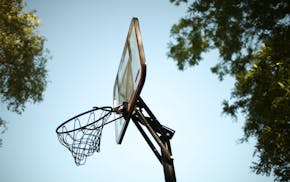For Tracy Byrd and his students, the expectations around cellphone use in his classroom are clear.
"The first time I see it, I'm going to just take it for the hour," said Byrd, a ninth-grade English teacher at Washburn High School in Minneapolis and the 2024 Minnesota Teacher of the Year. "I'm going to help you make a good decision and I'm just going to take it for the hour and I'll just have it."
If that approach is not successful, the phone goes to the dean of students and, if that fails to fix the behavior, well, things can escalate.
"That third time, now we have to bring in parents because, I mean, we've tried it twice and it's just not working," Byrd said. "So if it's a Friday at 3 o'clock, you might have to come get [the student's] phone or [the parent] might say, 'You know what, you just hold it until Monday,' which we will."
The scramble to find solidarity and effective rules across Minnesota's schools aligns with a pending state law that will require school leaders to "adopt a policy on students' possession and use of cell phones in school by March 15, 2025." Many schools have already moved toward detailed restrictions and bans.
I'm not convinced this blanket approach to cellphone usage in schools addresses all the multi-layered challenges. Admittedly, I'm a biased parent who feels more comfortable knowing that in a world of mass shootings and other emergencies in our schools, I can communicate with my girls when necessary. But it's more than fear that has me thinking cellphones have some value in teens' lives.
Today, my daughters can watch live video from a NASA rover on Mars, talk to their aunt who lives in Mexico City via FaceTime and read a textbook, all on their phones. Some of the folks who've implemented these cellphone policies also carried a quarter to school when they were kids just in case they had to use a pay phone. That generational gap also contributes to the mass denial of the truth that the kids have been subjected to policies rooted in antiquated views of cellphones that ignore their ubiquitous influence in all of our lives.
"When it comes to cellphones, both the positive and the negative … the negative, which they're trying to address with the policy of full bans, is the idea that they're a distracting device, when in fact, it's a very powerful technology," said Victor Pereira, a Harvard University lecturer who has studied the impact of cellphone use in classrooms. "There are a lot of educational apps that support teaching and learning for the students, so [those policies] are, quite honestly, surface level."
Pereira said he's not sure there is a universal policy that will work for all students but he believes the complexities of the issue should be acknowledged and the kids should be at the table. This is especially true considering that the adults in the room have collectively failed to model behaviors that would curb some of the obsessive usage that has created these problems in classrooms.
According to a 2024 Pew Research study, 83% of adults use YouTube, 68% of them are on Facebook and 47% of the same group have Instagram accounts. And the TikTok craze that's impacted most of our children's lives? TikTok use among adults had risen by 12 percentage points since 2021.
We're lying to our children if we're scolding them about their cellphone usage while we're posting vacation pictures on Instagram at 1:30 p.m. during a work Zoom. We are also asking them to strike a balance in their relationships with their cellphones that we have not yet achieved. And I don't believe "Well, I'm an adult" is a sufficient response to that truth, especially in the aftermath of a pandemic that encouraged new norms and habits around technology.
"During COVID, that was the technology that a lot of students in our country were absolutely dependent on," Pereira said. "That was their only link to humans in learning. If you have a family of five with one computer, maybe two computers, everyone is trying to Zoom into a classroom or a meeting. And so students were writing papers on their cell phones. They were attending Zoom meetings, they were talking to their friends."
Considering that reality, I think we all — not just the kids — need a new approach to cellphone use, if the goal is to create healthier habits in our schools and help our teachers. Despite my personal concerns about this issue, however, I believe the teachers' perspectives should be prioritized.
Byrd has witnessed the adverse impact of cellphone use in his classroom. And that's what concerns him most. While some kids can overcome the device's impact on their ability to learn, others cannot.
"There is a direct correlation between the amount of seat time you have in the classroom and the grade you receive," he said. "And there is a direct correlation between those who can regulate and monitor themselves and not be on their phone and have it be a distraction and the grades they receive."

Medcalf: Mia program provides safe space for young people to create

Medcalf: George Floyd's daughter, now 11, on life without her dad: 'It's hard'

Medcalf: A love letter to Minnesota libraries and the people who work there
Medcalf: Today's racism may end in tomorrow's shame


